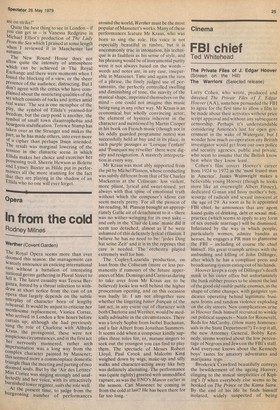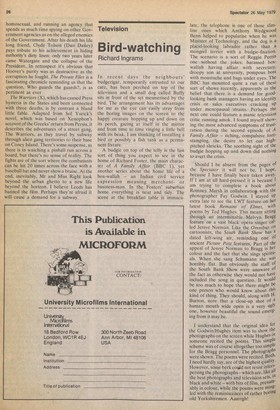FBI chief
Ted Whitehead
The Private Files of J. Edgar Hoover (Screen on the Hill) The Warriors (Selected release) Larry Cohen, who wrote, produced and directed The Private Files of J. Edgar Hoover (AA), somehow persuaded the FBI to agree for the first time to allow a film to be made about their activities without prior script approval and without any subsequent censorship. Perhaps it's understandable considering America's lust for open government in the wake of Watergate, but I wonder how much co-operation any British investigator would get from our own police and security agencies, public and private, who seem to assume that the British know best when they know least.
Cohen's film covers Hoover's career from 1924 to 1972 as the 'most feared man in America'. James Wainwright makes a believable young Hoover (though he looks more like an overweight Albert Finney), dedicated G-man and fussy mother's boy, scourge of radicals and sexual innocent at the age of 29. As soon as he is appointed FBI chief, he announces that any agent found guilty of drinking, debt or sexual malpractice (which seems to apply to any form of sex outside marriage) will be dismissed. Infuriated by the way in which people, particularly women, admire bandits as heroes, he engages a PR man to glamorise the FBI — including of course the chief himself. His great triumph arrives with the ambushing and killing of John Dillinger, after which he has a compliant press and broadcasting system eating out of his hands.
Hoover keeps a copy of Dillinger's death mask in his outer office but unfortunately the bank robber proves to be almost the last of the good old visible public enemies, as the shape of crime changes, with gangster syndicates operating behind legitimate business fronts and random violence exploding on the city streets. New complications arise as Hoover finds himself recruited to winkle out political suspects — Nazis for Roosevelt, Reds for McCarthy. (How many homosexuals in the State Department?) To top it all, the new Attorney General, Bobby Kennedy, seems worried about the low percentage of Negroes and Jews on the FBI's staff. And everyone knows about the Kennedy boys' tastes for amatory adventures and marijuana trips . . .
Broderick Crawford beautifully conveys the bewilderment of the ageing Hoover, clinging to the stoical simplicities of Kipling's If when everybody else seems to be hooked on The Prince or the Kama Sutra. By the end of his life he finds himself isolated, widely suspected of being homosexual, and running an agency that spends as much time spying on other Government agencies as on the alleged enemies of the Government. After his death his life long friend, Clyde Tolson (Dan Dailey) pays tribute to his achievement in hiding authority's dirty linen: only two years later came Watergate and the collapse of the President. In retrospect it's obvious that Hoover's purity was as destructive as the corruption he fought. The Private Files is a fascinating chronicle reminding us that the question, Who guards the guards?, is as pertinent as ever The Warriors (X), which has caused Press hysteria in the States and been connected with three deaths, is by contrast a bland little fable. Adapted from Sol Yurick's novel, which was based on Xenophon's account of the Greeks' return from Persia, it describes the adventures of a street gang, The Warriors, as they travel by subway through alien gang territories to their base on Coney Island. There's some suspense, as there is in watching a pinball run across a board, but there's no sense of reality. The fights are of the sort where the combatants can be hit 20 times across the face with a baseball bat and never show a bruise. At the end, inevitably, Mr and Miss Right look beyond the urban ghetto to a new life beyond the horizon. I believe Leeds has banned the film. Perhaps they're afraid it will cause a demand for a subway.



































 Previous page
Previous page